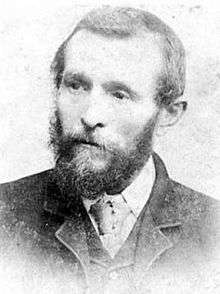John Netley

John Charles Netley (1860–1903) was an English cab driver who is notable because of later claims that he was involved in the 'Whitechapel Murders' committed by Jack the Ripper.
Biography
Netley was born in Paddington in London, the second eldest of nine children; his twin brother William Henry Netley died in infancy. [1] His father John Netley (1832-1912) was an omnibus conductor, and his mother was Mary Ann (née Terry) (1833-1886).[2]
John Netley was described as a "carman" (i.e. a goods wagon driver) in the census returns for the period.[3] He was employed by Messrs Thompson, McKay and Co., who described Netley as "very steady".[4] Netley died in an accident when the wheel of his van hit an obelisk in London's Park Road, where it joins onto Baker Street, near to Clarence Gate in Regent's Park. He was thrown from his van under the hooves of the horses where his head was crushed by a wheel. The jury at his inquest returned a verdict of accidental death, with a recommendation that the drivers of vans should be offered safety straps.
Allegations with regards to the Whitechapel Murders 1888
In 1888 John Netley was a Hackney carriage driver in London. In 1976, author Stephen Knight accused Netley of complicity in the Whitechapel murders in his book Jack the Ripper: The Final Solution. According to Knight, Netley drove the coach in which Sir William Gull carried out the actual killings as part of a conspiracy involving the royal family and freemasonry. Most scholars reject the theory as a fantasy, and consider Netley to be innocent.
Knight's conspiracy theory originated from the story of Joseph Sickert, who claimed to be the illegitimate son of Walter Sickert, another 'Ripper' suspect. He related that after the killings had concluded, Netley was heavily involved in attempts on the life of the young Alice Crook (supposedly the illegitimate daughter of Annie Crook and Prince Albert Victor, Duke of Clarence and Avondale, the grandson of Queen Victoria), trying to run her down with his carriage. Joseph Sickert claimed that he drowned after the attempt, having run to Westminster where he jumped off the pier. Sickert was wrong in this and therefore could not have based his story on any contemporary evidence, as has often been suggested. A newspaper report was found of a man who gave his name as "Nickley" being rescued by from the river by the pier master, and later discharging himself from hospital. Nickley could have been a misheard Netley - or a quickly assumed name. Stephen Knight said that the Dictionary of British Surnames did not list Nickley.
Further portrayals in fiction
Netley has been featured in several works based on the Jack the Ripper and the Royal Family conspiracy theory. In the 1979 film Murder by Decree, Netley was renamed William Slade, and played by actor Peter Jonfield.[5][6] In the 1988 made-for-TV film Jack the Ripper, starring Michael Caine, Netley was played by actor George Sweeney.[7] Netley was again portrayed as Gull's accomplice in the graphic novel From Hell. This version depicts Netley as semi-literate, and horrified by Gull's plans.
In the 2001 film adaptation of From Hell, starring Johnny Depp, Netley was played by Jason Flemyng.[8] Netley was featured in an episode of Sir Arthur Conan Doyle's The Lost World called "The Knife" that portrayed the Ripper murders as the collaborated work of Netley, Sir William Gull and a police inspector, Robert Anderson.
References
- ↑ William Henry Netley on Ancestry.com - pay to view
- ↑ 1861 England Census for John Charles Netley - Ancestry.com - pay to view
- ↑ 1891 England Census for John Charles Netley - Ancestry.com - pay to view
- ↑ Paul Begg, Martin Fido and Keith Skinner, 'The Jack the Ripper A to Z', Headline (1992)
- ↑ "The Holmes/Ripper files". Archived from the original on October 26, 2009. Retrieved 2009-10-19.
- ↑ IMDB
- ↑ Jack the Ripper (1988) - Cast & Crew - MSN Movies at movies.msn.com
- ↑ From Hell (2001) on IMDb